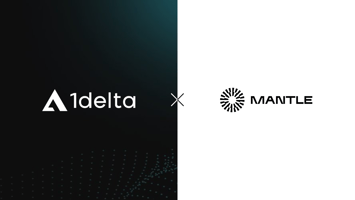At 1delta, we are on a mission to accelerate the transition to DeFi and foster a robust...
DeFi Basics: What is Margin Trading?
The decentralized finance (DeFi) landscape is rapidly evolving, with innovative platforms emerging to address the diverse needs of the crypto community. At the forefront of this revolution is 1delta, a cutting-edge DeFi protocol that aims to redefine margin trading. This article explains what margin trading is and the intricacies of margin trading in crypto.
What is Margin Trading?
Margin trading is an advanced trading strategy that allows traders to amplify their exposure to an asset by borrowing additional funds. In traditional markets, these funds are often borrowed from a broker. Traders deposit assets as collateral into a brokerage account and borrow for instance shares to get leverage. In the context of DeFi and platforms like 1delta, these funds are provided through decentralized lending protocols such as Aave or Compound.
Here's a simple breakdown:
Leverage: Margin trading allows traders to amplify their exposure to an asset without owning the full amount. This is achieved through leverage by borrowing additional funds. For instance, with a 2x leverage, a trader can open a position worth $2,000 with just $1,000 of their own capital.
Borrowing: To open a leveraged position, traders borrow funds. If a trader wants to amplify their position, they'll borrow the additional funds to do so. This borrowed amount is secured by the trader's deposits, which acts as collateral.
Potential for Higher Returns: With increased exposure, traders have the potential to realize higher profits if the market moves in their favor. For instance, if a trader uses 3x leverage and the asset's price increases by 10%, their profit would be 30% (minus any fees or interest).
Risk: It's crucial to note that while margin trading offers the potential for higher returns, it also comes with increased risk. If the market moves against a trader's position, they could incur significant losses, potentially even losing their initial investment or more. In DeFi, users usually can’t lose more than their initial investment.
Decentralized Margin Trading
Margin trading, at its core, allows traders to amplify their exposure to an asset by borrowing funds.While the fundamental concept remains consistent across both decentralized and traditional platforms, the mechanics, infrastructure, and risks can differ significantly. Let's break down the differences:
Trustless: In decentralized margin trading, smart contracts on blockchain platforms (like Ethereum) handle the borrowing, trading, and settlement processes. These contracts are self-executing with the terms of the agreement directly written into code.
Decentralized Lenders: Instead of borrowing from a centralized entity, traders borrow from a liquidity pool on a lending protocol. This pool is often funded by other users who earn interest on their deposits.
Liquidation Mechanisms: 1delta uses the robust liquidation mechanisms of the integrated lending protocols. If a trader's position becomes too risky, the underlying liquidation protocol automatically liquidates the position to ensure the protocol remains solvent.
Collateral Management: Users lock up collateral in the form of a crypto asset in a decentralized protocol. If the value of the trader's position drops too much relative to the collateral, the position can be automatically liquidated by the smart contract to repay the borrowed amount. Unlike with most brokers, DeFi usually allows any asset available in the lending protocol as a collateral.
Custody: In decentralized trading, users maintain control of their assets until the point of trade or when used as collateral. The funds are then handled or locked in a lending pool contract, where users maintain full control without access by a third party.
Interest Income: Users can directly benefit from passive interest rate income on all assets and fully participate in prime markets that, in CeFi, are only accessible to professional investors.
Composability: In the spirit of DeFi, the 1delta protocol is built to be composable which means that it can be integrated into other smart contracts to build new products and services.
Summary
Margin trading is a powerful tool in the hands of traders, offering the potential for amplified returns. With the introduction of 1delta, the DeFi community now has a robust, decentralized, and transparent protocol to trade on margin. As with all trading strategies, it's essential to understand the risks involved and to trade responsibly. With 1delta, margin trading in DeFi becomes as accessible and powerful as ever.
If you want to get started, visit the 1delta app or explore further blog posts on how to use 1delta.
Disclaimer: The content provided in this blog post is for informational purposes only and should not be construed as financial or investment advice. All actions based on this information are taken at your own risk. Past performance is not indicative of future results. Always consult with a professional before making investment decisions. 1delta or its affiliates accept no liability for any direct or indirect losses resulting from the use of this information.


